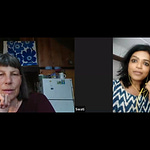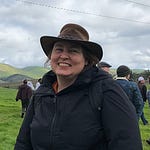In March of 2024, I was interviewed by three students at the Hanken School of Economics in Finland about carbon compensation and offsets. I’m posting part of our conversation here as an opening to a subject I’ve been immersed in for many years—even though it’s not my primary work.
It started when I was board chair at the Soil Carbon Coalition, with people from various start up companies approaching me and Peter Donovan at conferences wanting advice about how to model and predict soil carbon gains based on farm practices—in order to set up a carbon compensation program for farmers. Some wanted to hire me to create metrics for big banks on Wall Street to invest in soil carbon. Some of those people went on to create companies that have programs I find somewhat troubling.
From 2019 to 2023 I served on Vermont State’s Payment for Ecosystem Services (PES) and Soil Health Working Group, attending two meetings a month. The working group came out of an innovative initiative to hire farmers to regrow Vermont’s topsoil and restore the function of our watersheds.
During those years I watched as special interest groups redirected our agenda in ways that were deeply frustrating and confusing. (For example we were given a couple of hours to come up with a price per unit of soil health. WTF?)
This was all happening in the confusion of covid shutdowns. Weirdly related news was hidden in the headlines during those years that most people didn’t catch, but some of us were noticing. In September of 2020, water futures became a tradeable commodity on Wall Street, like gold or oil, based on the assumption of future scarcities.
In September of 2021, the New York Stock Exchange announced the creation of a new asset class called Natural Asset Companies. This asset class—valued at many times the entire global economy—would give shareholders rights to the financial trading value of various “ecosystem services” in forests, farms, and other land. Some of the people engaged in our group’s agenda turned out to be behind the Natural Asset Class initiative—and announced proudly at a conference that Vermont’s pilot PES program was a testing ground for how these markets could be developed.
The general argument for the financialization of nature and carbon offsetting is that in a world where markets rule, the only way to save nature is to put a price on it, which sounds convincing, and might be true (though my colleagues and I think there are far far better approaches—such as creating new money to get the job done, the way we do when we want to win a war or bail out banks).
But it seems that another (and more likely subconsciously motivating) narrative is that the only way to make a shit-ton of money off of nature is to claim to be saving it, while actually accumulating control over resources and making profits for the wealthy. In either case, there are assumptions that are problematic, and the foundations of this movement are beyond shaky.
Just for starters, according to recent research over 90% of forest carbon credits are false. Other carbon credits are simply unethical, for example creating starvation in one country to “offset” a burger chain in another. In some places, especially in the Global South where land tenure is not well defined, indigenous groups are being kicked off of land in order to “protect” the carbon.
Investors and start ups can make a pile of money enlisting landowners, governments, and tribal groups in these schemes, selling the credits to companies, and then offering low or uncertain returns to the people doing the actual stewardship of the land.
Ultimately we were able to steer our working group in a different direction, favoring public rather than private finance to improve our watersheds. We increased the amount of money available to farmers through the Conservation Stewardship Program, and we came out strongly against out-of-state markets for carbon and other “ecosystem services” in our final report to the legislature.
However, coming out of many years of those meetings, I see the need for much more critical thinking. Just because an initiative purports to help the climate, farmers, or biodiversity, is it always the right thing to do?
I’ll continue to write about this.














Carbon Offsets, Species Banking, and the Financialization of Nature: an interview with Didi Pershouse